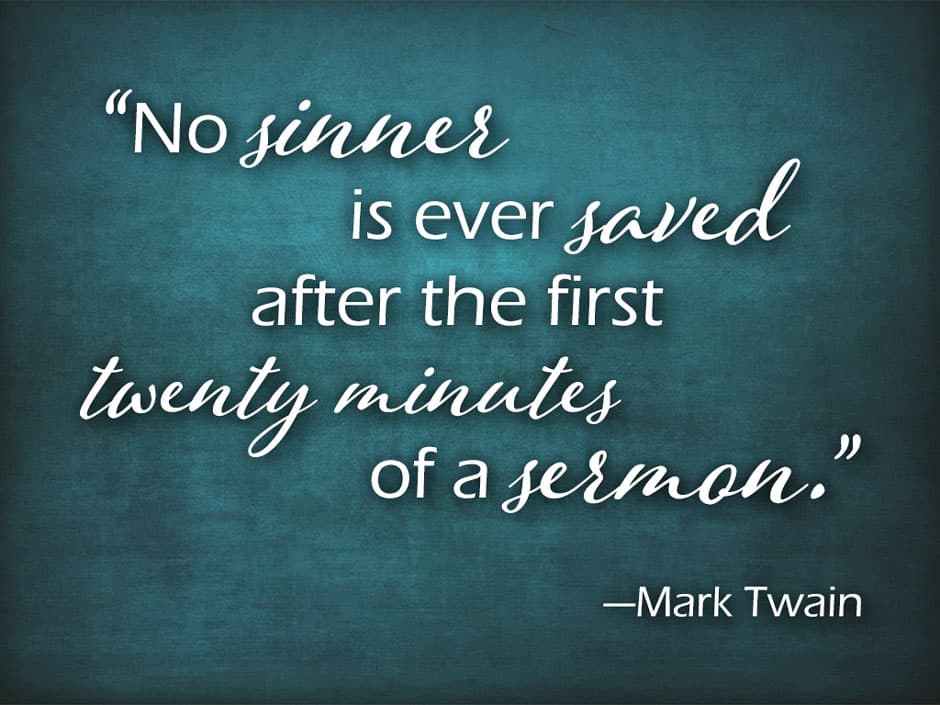The Why and the What of Sermon Writing

How to Help Your Congregation Chew Their Food
By Timothy Merrill
Everyone except the preacher seems to agree that a good sermon’s most appealing attribute is brevity. Hands down. The late comedian George Burns once said, cigar in hand, that “the secret of a good sermon is to have a good beginning and a good ending, then having the two as close together as possible.” It’s a sentiment shared by Mark Twain who believed that “no sinner is ever saved after the first twenty minutes of a sermon.”
While the laity may have clarity about good sermons and how to write them, preachers, homileticians and scholars of the Bible have been poking around on this subject for millennia. This conversation began in the early church, continued through the medieval period by way of the Dominicans (Order of Preachers) as well as the Franciscans, and Alain de Lille’s masterful, The Art of Preaching, rolled on through Luther and the Reformation and continues in force today.
Writing sermon text is the science of homiletics. According to Emerson, “If a man can write a better book, preach a better sermon, or make a better mousetrap than his neighbor … the world will make a beaten path to his door.” The path to your door may not be beaten, but this has not discouraged you, nor should it, from looking for ways to improve your sermon preparation or to do it in less time.
There are a ton of resources out there with sermon writing suggestions. “Pick a topic, main idea, or biblical passage.” “Start with prayer.” “Find a good writing space.” “Write a sermon outline.” Ad infinitum.
But just as important — and often overlooked — are the processes prior to arriving at these helpful steps and gratuitous tips. It is during the pre-writing phase that we ask the questions that must be posed of the sermon we propose to write, and the question about whether writing a sermon is even what we want to do.
Rather than covering the well-traveled path of “how-to” options, let’s instead turn to the interrogatives why and what.

Why am I writing this sermon?
One reason: To help the congregation chew their food.
Some time ago, I decided to visit my 7-year-old daughter during lunch period at school. We met in the lunchroom with about 150 other kids.
The noise was deafening. The children, out of class and for the most part away from the teacher’s X-ray vision, did everything verbal that can be done — talking, yelling, laughing, singing, crying and so on. Sometimes it was hard to hear each other speak.
It was a 30-minute period, and with five minutes to go, the cafeteria monitor spoke clearly and firmly into the microphone: “Time for silent lunch, children. No talking.”
Suddenly, the cafeteria was as quiet as a shadow.
I asked what was going on. One parent nearby explained. “If we don’t have silent lunch, the children don’t eat. They’re so busy talking and doing other stuff, they forget to eat. If they have to be quiet, well, they might as well eat their lunch. So, the last five minutes of lunch period is silent lunch. That’s when they eat.”
Ah!
This could be one reason we write sermons and preach them: In worship, we sing, we pray, we greet one another, we confess, we give our tithes, and then, suddenly, it’s silent lunch — the time when the preacher gives the congregation a happy meal with something to chew on. With God’s help, they might still be chewin’ when they leave the building.
This is why we write the sermon: We’re preparing the food. It’s feeding time.
But we ask, why do I need to write a weekly sermon manuscript? Why can’t I just think about the sermon? Pray about the sermon? Doodle or take some sermon notes or jot down a few big ideas about the sermon illustrations I’m going to deliver?
The short answer is that you can. Doodle and pray and let the Holy Spirit do the rest. If this is working for you, hallelujah! But the truth is, there is always some other way to do anything. If writing a sermon is not your thing, then figure out what is your thing and get on with it.
But in your attempt to do it better, try not to make it worse! This was the concern of the non-preaching Lord Kelvin, a 19th-century Belfast mathematician and pioneer in the field of electrical energy (a kelvin is a unit of temperature), “What is not defined cannot be measured. What is not measured, cannot be improved. What is not improved, is always degraded.”
Writing a sermon is what Kelvin refers to as “defined.” Writing defines the sermon. A sermon that has been defined can be evaluated, and a sermon that’s been evaluated can be improved. A sermon that has not been improved or is not improving, probably is going to tank.
So, we write sermons in order to hone our craft and to see what we’re dealing with when the time to deliver the oration arrives. We write because in writing, the sermon reveals itself.

What am I going to write?
The answer to this question depends on the audience, the occasion, the season of the year, ongoing cultural events, the lectionary scripture or events in the preacher’s own life. All sorts of variants determine what a preacher decides is the subject of the next sermon.
I once prepared three sermons, and on Sunday morning gave the congregation a choice. I didn’t tell them that they were going to get the full load of the sermon series on the following two Sundays, regardless of their vote. It was just a question of sequence. They totally bought into this and after voting were highly invested.
What preachers might give more attention to is outcomes. Writing a sermon should be affected by outcomes, or targeted goals. Many preachers have the romantic idea that after preparing a homiletical feast of at least three or four courses, the congregation will rise and call them “blessed” and leave the sanctuary table transformed forever.
That doesn’t happen, any more than when you leave the table after gorging a double cheeseburger and jumbo fries. The only transformation one may feel then is the need to let the belt out a notch or two.
That said, it’s also true that it’s difficult to write a sermon and not have the foggiest notion of how you want to end it, or where you want to be at the end. A preacher wants something to happen! She or he wrestles with the “call of action.”
The pastor who writes a sermon is similar to the teacher who writes a lesson plan. When writing a lesson plan, good teachers always have targeted, measurable goals and may even announce these to the class: “Here’s what we’re going to do today, boys and girls. At the end of the hour, you will have mastered the present tense and be able to conjugate any regular ‘-ar’ verb en español. Hablo, hablas, habla, hablamos, hableis, hablan.”
When teachers write a lesson plan, they frame the target objective in language the students can understand, because they want them to buy in and be engaged in their own learning. This is the theme of Ron Berger’s book, Leaders of Their Own Learning. Perhaps the preacher could write a learning target in the words of the listener that goes like this: “After this listening to (or watching) this sermon, I will be better equipped to handle interruptions in my life.”
Some teachers write an “exit ticket” for their students. Before leaving class, the student is asked to complete a form, or write a reflection piece, or answer some questions which demonstrate the extent to which they have or have not mastered the material. Successful completion of the exit ticket means a student can leave class early. Burns and Twain would have loved this!
Here’s an idea: Write an exit ticket for the congregation to complete after the sermon has been delivered. “Done right, you may leave early!” People will be hanging on to every word! “I’ve heard God’s word! I have learned that I can trust in Jesus! Praise the Lord!”
The difference between a teacher’s lesson plan and the preacher’s sermon writing is that the teacher has an audience at the same grade level, same incipient motivation (to pass the class or even get an A) and same learning context — they are in a school, which by definition means they are there to learn something.
Preachers do not have this advantage. Their audiences often cannot explain why they are there, but if pressed, the reasons might include “to see my friends,” “because we always go to church on Sundays,” “we like the air-conditioning” or “my parents made me come.”
The audience is also a mishmash of church leaders and occasional attendees with different ideologies, theological ideas and political biases. There is seldom any single cultural event around which the congregation could ever rally en masse.
Yet preachers are asked to prepare topical and expository sermons based on a biblical text or verse that appeal to broad audiences without creating an uproar. When I was the pastor of an international congregation in China, I worried about this. For example, there were three T-words, which, if mentioned in a sermon would have resulted in a mandatory visit to the Shanghai Religious Affair Bureau. These were: Tiananmen, Tibet and Taiwan. But I had total freedom when talking about religious and theological themes relevant to my occupation.
You do too. For example, you might want to target faith-building or faith formation as a suitable, if hardly measurable, goal for your sermon writing.
This is the essence of the apostle Paul’s discussion with Timothy about “handing down” the faith that had been given to him. We have a “hand-me-down” faith, just like the hand-me-downs many a preacher’s kid had when they were growing up. And whenever we stop handing it down, we’ll go down. When we get involved in hand-me-down faith, we become “hand-me-up” people. You extend a hand down only to help give someone a hand up. Who would object to getting a few “hand-me-ups?”
A discussion like this tends to encourage and build up one’s faith.
Instead of focusing on faith, however, you might target change as the outcome in the sermon you’re writing. Your goal is to help the congregation lean into change, or to motivate a few dear souls to change their minds, knowing, as G.B. Shaw once put it, “If you can’t change your mind, you can’t change anything else.”
A sermon on this subject might remind the audience, that, like closing a document on the computer, it is important to save your changes. You’ve seen the message: “Do you want to save your changes?” Sometimes I’ve accidentally clicked “No” for some mindless reason, and all my changes, all my work is gone, and I am now madder than a junkyard dog. I had made changes, good changes. Then I failed to save my changes. Lesson learned and it is a good lesson to share with the congregation.
It’s been well-noted that the job of a preacher is to comfort the afflicted and afflict the comfortable. Whether disturbing or comforting, preachers continually try to get the congregation moving. They do not want to be becalmed on a sea of tranquility. David Allen, author of Making It All Work, once said to me in a Homiletics Interview, “It’s easier to move when you’re already in motion.”
When you’re writing a sermon, this is what you’re doing: You are trying to blow some wind into ecclesiastical, institutional or personal sails. You’re huffing this congregation out of the harbor, or you’re blowing it out toward the ocean. Either way, your preaching over time will keep the congregational boat in motion, or get it moving — creaking and groaning — out to sea!
Sermons that do this are good sermons, Burns and Twain notwithstanding.
Share this Post:
Looking for More?
Imagine having fresh help in preparing your sermons right at your fingertips, especially during those weeks when your words and ideas are not flowing easily. Homiletics Online won’t write the sermon for you but once you’ve used this treasury of solid content, you’ll wonder how you ever got along without it.
Would you like to see your post on this blog?
We are always looking for talented and passionate writers who want to share their ideas on preaching the Gospel. If that sounds like you, then please use the button to submit a guest post.

